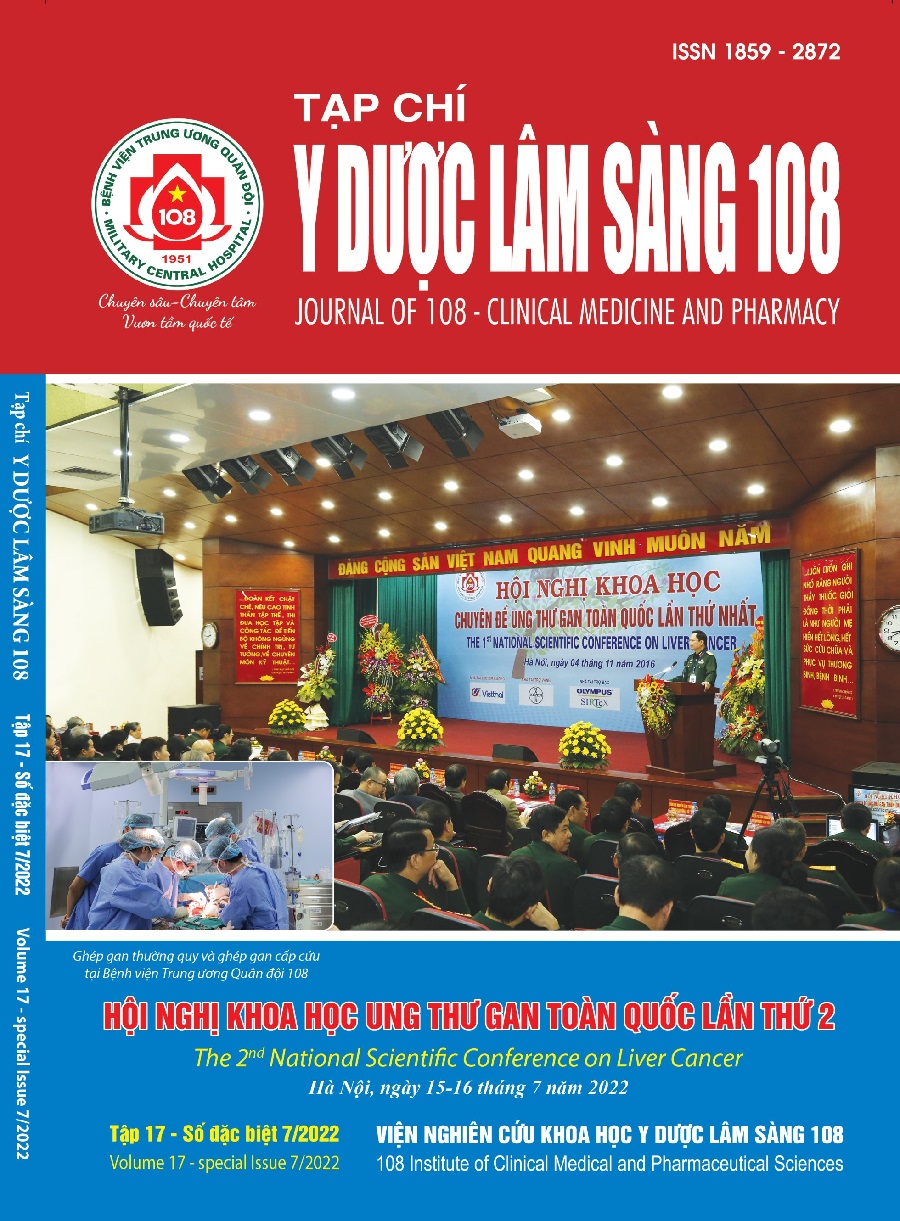Predictive factors of recurrence after liver resection for hepatocellular carcinoma
Main Article Content
Keywords
Abstract
Objective: To analyze several factors affecting recurrence and disease-free survival (DFS) in patients with hepatocellular carcinoma (HCC) of whom liver resection was first treatment. Subject and method: 1704 HCC patients who underwent liver resection as first treatment at Liver Tumor Department, Cho Ray Hospital, Ho Chi Minh City, Vietnam between January 2015 and December 2019 were enrolled in a retrospective study. Those patients were followed up until June 2021, with follow-up time is at least 18 months and at most 78 months. The prognostic significance of viral infection, AFP level, and various pathological factors were evaluated by univariate analysis using the log-rank test and by multivariate analysis using the Cox proportional-hazards regression to determine the related factors affecting DFS and by logistic regression model to determine the factors affecting recurrence. Result: Univariate analysis showed that AFP level, vascular invasion, tumor number, tumor size, histological pattern, Edmonson-Steiner staging, tumor necrosis, accompanying resectable metastatic tumors, resection level are related to recurrence and DFS, while underlying liver disease is only related to DFS. Logistic regression model showed that AFP level, vascular invasion, tumor number, tumor size, accompanying resectable metastatic tumors are independent prognostic factors for recurrence. Multivariate analysis using the Cox proportional-hazards regression showed that tumor number and accompanying resectable metastatic tumors were independent prognostic factors for DFS. Conclusion: For HCC patients who received liver resection as first treatment, AFP level, tumor number, tumor size, histological pattern, Edmonson-Steiner staging, tumor necrosis, vascular invasion, accompanying resectable metastatic tumors, resection level are related to recurrence and DFS. Underlying liver disease is related to DFS. Viral infection is not related to recurrence and DFS.
Article Details
References
2. Aziz AM et al (2016) The safety and adequacy of liver resection for large hepatocellular carcinoma: A retrospective single institute study. Saudi Surg J 4: 20-28.
3. Hong YM et al (2017) Risk factors of early recurrence after curative hepatectomy in hepatocellular carcinoma. Tumor Biol: 1-8.
4. Kim WJ et al (2019) Prognostic markers affecting the early recurrence of hepatocellular carcinoma with liver cirrhosis after curative resection. Intern J Bio Markers 34(2): 123-131.
5. Kwon SK et al (2014) The risk factors of early recurrence after hepatectomy in Hepatocellular carcinoma. Ann Surg Treat Res 86(6): 283-288.
6. Orcutt ST et al (2018) Liver resection and surgical strategies for management of primary liver cancer. Cancer Control 25(1): 1-15.
7. Park SK et al (2013) Factors influencing hepatocellular carcinoma prognosis after hepatectomy: A single-center experience. Korean J Intern Med 28: 428-438.
8. Ma L et al (2022) Nomograms for predicting hepatocellular carcinoma recurrence and overall postoperative patient survival. Front. Oncol 12: 843589.
9. D’Silva M et al (2021) Pathological prognostic factors for post-resection survival in patients with hepatocellular carcinoma associated with
non-alcoholic fatty liver disease. Transl Cancer Res 2021 https://dx.doi.org/10.21037/tcr-21-707.
10. Wei T et al (2020) Tumor necrosis impacts prognosis of patients undergoing curative-intent hepatocellular carcinoma. Ann Surg Oncol 28(2): 797-805. doi: 10.1245/s10434-020-09390-w.
 ISSN: 1859 - 2872
ISSN: 1859 - 2872
